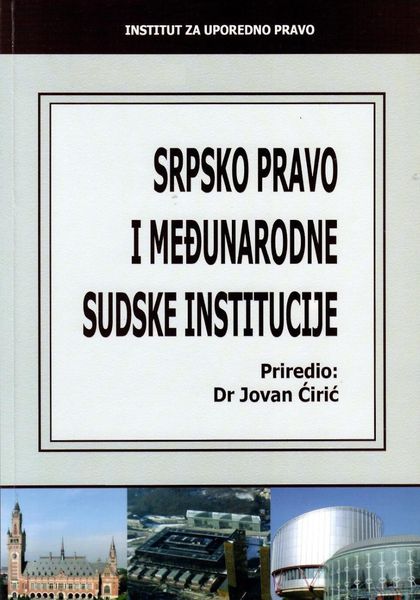Međunarodno sudstvo danas
International Judiciary Today
Author(s): Boris Krivokapić
Subject(s): International Law
Published by: Institut za uporedno pravo
Keywords: courts; development of courts by the number and type; perspective of international courts
Summary/Abstract: It can often be heard that international judiciary is insufficiently developed, and more importantly, that it is not mandatory, but optional. In this regard it could be pointed out that the international community doesn`t have centralized judicial system; that countries could become subjects of international court`s jurisdiction, only if they explicitly agree to it, etc. However, time in which we live is the time of accelarated, general globalization, and it led to significant changes in all spheres of life, including this one. Generally speaking, even nowdays the international judiciary is optional, although in the meantime certain major changes have happened. That is quite understandable bearing in mind the fact that there is a growing number of main subjects of the international law-countries and international oragnizations; that some new subjects of the international law were made, and they led to certain new kind of international disputes etc.
Large number and diversity of international courts suggests that it would be advisable to make certain divisions and place them into appropriate categories in order to understand them better. At the same time it is an opportunity to present not only the most important but also some less known but for some reason particularly interesting international courts. Accordingly, the paper represents an attempt to point out some of the most interesting divisions or kinds of international courts (universal and regional; courts for the settlement of disputes and ( penalty) criminal courts; courts of general jurisdiction and specialized courts; courts for states and others; institunationalized international courts and selected courts (arbitrations); permanent and temporary courts; international courts in the right sense of the word and mixed courts, etc. Within these, further divisions were made.
Bearing in mind that international courts have developed incredibly both by the number and the type, in organizational sense and in connection with the role they have in the international community, author in the concluding discussion points out some specific problems and perspectives of international judiciary.
Book: Srpsko pravo i međunarodne sudske institucije
- Page Range: 15-66
- Page Count: 52
- Publication Year: 2009
- Language: Serbian
- Content File-PDF

